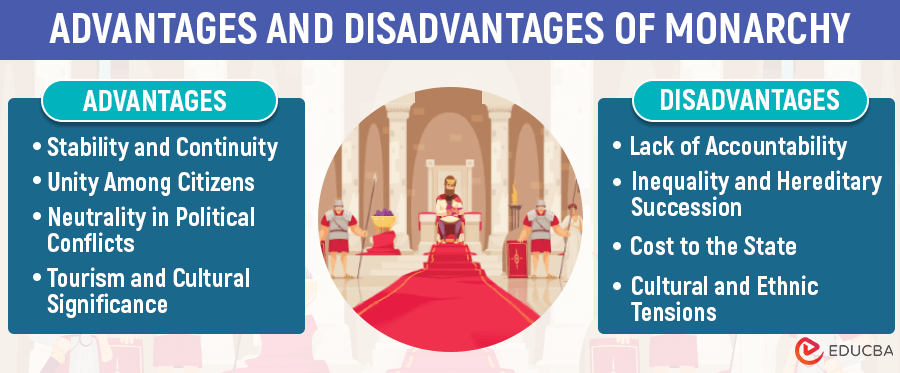Updated August 28, 2024

Advantages and Disadvantages of Monarchy – Introduction
In a world where most countries are fighting for democracy, imagine a nation ruled by kings and queens. Countries such as the UK, Japan, Thailand, and more still follow the ancient governing practice called monarchy. There are clearly two sides to this system, so in this article, let us explore the good and not-so-good sides of monarchy.
Here are the various advantages and disadvantages of monarchy.
Advantages of Monarchy
1. Provides Stability and Continuity
Countries under monarchies are often more stable and have continuity in government. This is because the head of state remains unchanged over long periods.
2. Promotes Unity Among Citizens
Monarchs often serve as symbols of national unity, helping to bring people together across different regions and demographics.
3. Constitution Limits Negative Use of Power
Many modern monarchies are constitutional, meaning they have a constitution that limits the monarch’s powers, ensuring a system of checks and balances.
4. Improves Tourism and Preserves Culture
Monarchies are often known to preserve cultural heritage, which attracts tourists and contributes to the economy.
5. Provides Diplomatic Advantages
Monarchs can act as diplomatic figures and goodwill ambassadors, fostering international relations.
6. Expertise and Training Assist in Effective Governance
Monarchs often receive extensive training and education in the responsibilities of their position, allowing them to rule efficiently.
7. Allows Long-term Planning
Monarchs can plan for the long-term benefit of their nation, as they do not face re-election pressures.
8. Maintains Neutrality in Political Conflicts
Monarchs often remain neutral in political disputes, which can help mitigate conflicts in their countries.
Disadvantages of Monarchy
Let’s look at some of the disadvantages of monarchy:
1. Lack of Accountability
Some monarchs may lack accountability, leading them to make decisions without the public’s input, potentially ruling like dictators.
2. Inequality and Hereditary Succession
Monarchies often choose the next ruler as per hereditary succession, continuing social and economic inequalities.
3. Potential for Tyranny
Monarchs can become oppressive rulers, undermining human rights and silencing opposing voices.
4. Limited Representation
Monarchies can limit the representation and participation of citizens in the political process.
5. Cost to the State
Maintaining a monarchy can be expensive, with taxpayers often funding the royal family’s lifestyle and official duties.
6. Dynastic Struggles
Hereditary monarchies can lead to power struggles within royal families, which can destabilize the nation.
7. Gender Inequality
Many traditional monarchies favor male heirs over female heirs, perpetuating gender inequality.
8. Cultural and Ethnic Tensions
Sometimes, monarchies can increase the tension between cultural and ethnic groups if the ruling monarch represents only one segment of the population.
These were the top advantages and disadvantages of monarchy.
Recommended Articles
We hope you found this article on the advantages and disadvantages of monarchy helpful. Refer to the following recommendations to view similar articles,
